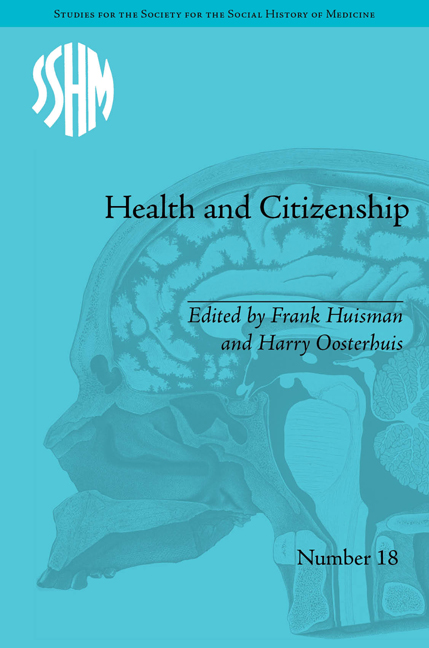Book contents
- Frontmatter
- CONTENTS
- Acknowledgements
- List of Contributors
- The Politics of Health and Citizenship: Historical and Contemporary Perspectives
- Part I Liberal Citizenship and Public Health
- Part II Social Citizenship: Health in the Welfare State
- Part III Neo-Republican Citizenship: Health in the Risk Society
- Notes
- Index
The Politics of Health and Citizenship: Historical and Contemporary Perspectives
- Frontmatter
- CONTENTS
- Acknowledgements
- List of Contributors
- The Politics of Health and Citizenship: Historical and Contemporary Perspectives
- Part I Liberal Citizenship and Public Health
- Part II Social Citizenship: Health in the Welfare State
- Part III Neo-Republican Citizenship: Health in the Risk Society
- Notes
- Index
Summary
At the end of the Second World War, health was defined as a universal human right. The Preamble to the Constitution of the World Health Organization, drafted in 1945, states that ‘(t)he enjoyment of the highest attainable standard of health is one of the fundamental rights of every human being without distinction of race, religion, political belief, economic or social condition’. And article 25 of the Universal Declaration of Human Rights, proclaimed by the United Nations in 1948, reads: ‘Everyone has the right to a standard of living adequate for the health and well-being of himself and of his family, including … medical care’. In the course of the twentieth century health and disease became a matter for the state in most Western countries as well as in the former communist world. The provision of medical care is considered not just as a favour or a commodity, but as a civil right – no matter whether such rights are explicitly laid down in constitutions, in social security laws or in the administrative regulations of the welfare state.
The notion of health care as a civil right can historically be traced back to the enlightened human rights discourse based on natural law, the principles of the American Declaration of Independence (1776) and the Déclaration des droits de l'homme et du citoyen, issued by the revolutionary French National Assembly in 1789.
- Type
- Chapter
- Information
- Health and CitizenshipPolitical Cultures of Health in Modern Europe, pp. 1 - 40Publisher: Pickering & ChattoFirst published in: 2014

